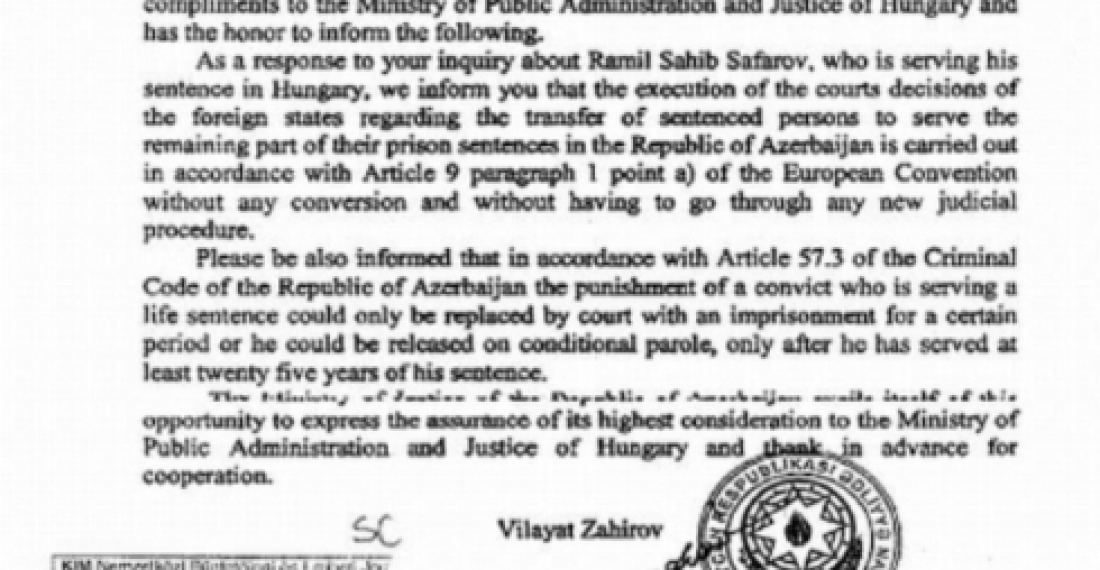The Government of Hungary has been deeply embarassed by the release of Ramil Safarov after he was retuyrned to Azerbaijan on Friday. Safarov has been convicted and sentenced to life imprisonment by a Hungarian court for killing an Armenian officer in his sleep, whilst both were attending a NATO course in Budapest in 2004.
On Saturday the Hungarian Foreign Ministry summoned the Azerbaijani Ambassador in Budapest and handed him a protest note. The note says:
"Hungary refuses to accept and condemns the action of Azerbaijan, which contradicts the relevant rules of international law and sharply contrasts the undertaking of the Azerbaijani side in this matter, confirmed by the Deputy Minister of Justice of the Republic of Azerbaijan in his letter XX-NBSKFO/3743/4/2012 of 15 August 2012 addressed to the Ministry of Public Administration and Justice of Hungary," the document said.
According to the ministry, in this letter Azerbaijan quoted the relevant international Convention and undertook that the sentenced person would serve the remaining part of his prison sentence in Azerbaijan and may be released on conditional parole only after at least 25 years.
"Hungary regards the decision of Azerbaijan inconsistent with the spirit of cooperation based on mutual trust that has been achieved during the past years between our respective countries," the note added.
The Government of Hungary also released a copy of the letter that was sent by the Azerbaijani Ministry of Justice to its Hungarian counterpart in August, which it claims shows that the Government of Azerbaijan had promised that Safarov will continue to serve his life sentence in an Azerbaijani jail.
Safarov was promptly pardoned by President Ilham Aliev on his arrival back in Baku. On Saturday the Azerbaijani Defence Ministry promoted Safarov to the rank of major and gifted him an apartment in Baku.
Commonspace.eu political editor said in a comment that this episode has the potential to create many unexpected consequences and will have long term implications.
"At best the Government of hungary acted naively and the incident will seriously undermine its credibility. Closer to the region however a new situation has been created that may have serious negative impacts on any effort to resolve the Nagorno-Karabakh problem peacefully.
The self declared Nagorno-Karabakh Republic is today celebrating the anniversary of its 'declaration of independence'. Former president of the self declared republic, Akadi Goukassian, who holds the rank of Advisor to the Armenian president, told Armenian media that further negotiations with Azerbaijan are meaningless. Reflecting on Ramil Safarov's extradition to Azerbaijan, he said the international community must definitely react to this, and 'Armenia and Artsakh must be able to use the moment correctly, invite the international community's attention, and receive maximum result.'
Armenian Foreign Minister Edward Nalbandian is today in Paris where he was expected to meet the mediators from the OSCE Minsk Process. Many in Armenia blame Nalbandian for being an ineffective Foreign Minister. In this case however there is very little that he could have done since Armenia's leverages on Hungary are close to none. Some observers however think that under Nalbandian's leadership the Armenian Foreign Ministry has become "a one man show" and that it has been focused on the wrong priorities.
For the moment the Azerbaijani leadership is basking in the popularity of its decision to release and honour Safarov. What implicatiuons this incident will have however, on the credibility of the Azerbaijani leadership in international fora, is however too early to say, although the statement of president Obama expressing dismay for the moment sums up the international reaction."
source: commonspace.eu with Hungarian, Armenian and Azerbaijani media.
photo: The letter from the Ministry of Justice of Azerbaijan that Hungary says assured it that Safarov will not be released on his return to Baku







